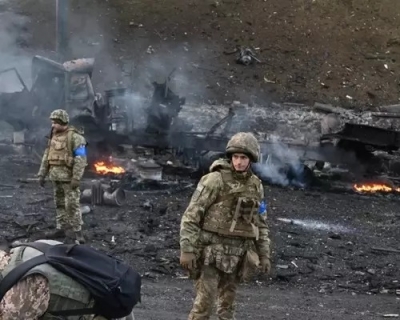Los Angeles, April 9 : Staff at Ukraine’s top studio, Film.UA, didn’t think much of the abandoned bomb shelter on site.
A vestige from past conflicts, the sealed shelter remained unused next to the company’s extensive wardrobe department for years.But at the outbreak of war, the space was hurriedly reopened to host at least 90 Ukrainians taking cover from Russian air raids, reports ‘Variety’.
Located on the outskirts of Kiev, Film.UA, one of the largest production players in Eastern Europe, had been celebrating the premiere of one of its major film projects, ‘The Big Picnic’, the night before Russia’s invasion of Ukraine on February 24.
“Some people had hangovers in the morning, and they woke up to the news of war,” says Kateryna Vyshnevska, head of development and co-production for Film.UA.
“Some of our colleagues went to work as normal, but then that was also weird because you come to work and realise, ‘This is war’.”
Everything stopped that day.Projects filming in Film.UA’s soundstages were put on hold, and work ground to a halt as the cold reality of a long-feared Russian invasion sunk in.
According to ‘Variety’, initially, the plan was for the studio, an old, repurposed factory building, to become a shelter for Film.UA employees.
“But then it just grew bigger than that because we have a saying in Ukraine now: Every Ukrainian is either a warrior or a volunteer.You can’t just stand aside” says Vyshnevska.
Almost immediately, the studio opened its doors to people from the surrounding Troyeschina district, many who were older, vulnerable and unable to easily evacuate to safer locations.
The bomb shelter was quickly retrofitted as a refuge during air raids, and some of the wardrobe department’s thousands of costumes were used for aid.The company’s catering company set up kiosks and worked non-stop to feed everyone and deliver food parcels to those with limited mobility.
At one point, almost 100 people, including a woman and her newborn baby were taking shelter at Film.UA.
Vyshnevska recalls a “scary moment” when the team realised that the Ukrainian army’s air defense unit, used to shoot down Russian missiles, had been stationed the next street over from the back of the studio.
An old World War II bomber plane stationed in front of the studio as decoration during peace time was also a cause for concern.
“It meant that, potentially, the area could become a target for the Russians,” explains Vyshnevska.But, luckily, that never transpired, and Russian forces are now retreating from Kiev and surrounding areas.
Vyshnevska herself had a narrow escape from the city.
The executive, who splits her time between London and the Ukrainian capital, escaped on March 7 to the south, and then on to Moldova and eventually Romania.
She has been travelling around Europe ever since, talking to industry at markets like Series Mania and MipTV and encouraging the film and TV community to continue working with Ukraine so that the local industry survives the war.
All the while, she had been desperately trying to confirm the safety of her Mariupol-based mother.For 17 days, without any sort of communication, she didn’t know whether she was dead or alive.
Part of her building, and Vyshnevska’s childhood home, no longer exists, having collapsed after three hits during intense fighting in the eastern Ukrainian city.But somehow, Vyshnevska’s mother was evacuated, and is now in Lviv, waiting to cross the border into Poland.
With support from London MP Tulip Siddiq, who played an integral role in securing the recent release of Iranian-British dual citizen Nazanin Zaghari-Ratcliffe from Iran, Vyshnevska was able to get her mother a visa to come to the UK.She’ll fly to Warsaw on Monday and help her make the journey to London.
The rest of her time is spent rallying the industry for support, for assurances that it won’t leave Ukraine behind.Although Russian troops are retreating from cities such as Kiev, the war continues.
As Film.UA Group CEO Victoria Yarmoshchuk told MipTV delegates earlier this week, Ukraine doesn’t need mercy, pity or condolences.What it needs are new projects, international co-operations and jobs for people in the creative sector.
“On the first day of war, we realized that content is our weapon,” said Yarmoshchuk.”Ukrainian stories are not local stories; they can be understood everywhere.The best thing the world can do right now is to collaborate with us.”
Representatives of Film.UA Group, Media Group Ukraine, 1+1 Media and StarLightMedia, once rivals for content and viewers, came together in Cannes during a “Stand with Ukrainian Content Industry” session, urging international players to notice their showrunners, producers and writers, ready to work right now.
One key objective is organizing an industry fund that, ideally, would receive contributions from big companies such as Disney and Netflix.
“This is to create jobs so that we can help ourselves, and so (displaced Ukrainians) in Europe and all over the world can go home,” says Vyshnevska.
The fund is still in early stages, but “we hope the streamers will contribute, because they have a responsibility as the most international players”.
Vyshnevska adds that although filming in Ukraine is now on hold, other work such as dubbing and localization is still possible.Film.UA staff were initially working from home, but are now back at the studio doing voiceover and dubbing work for all the channels as well as news outlets.
A 20-person team stationed across Ukraine is also producing an animated series chronicling the history of the Ukrainian resistance.
“We have no choice: We have to go back and do what we do,” says Vyshnevska.”If channels start buying more Ukrainian content, it immediately helps.If they start doing animation or post-production work with Ukrainians, this will help.We have a plan of how we can go back to production, and the industry has to help.”
dc/ksk/
#studio #shelter #China #Los Angeles #London #Zen #Disney







